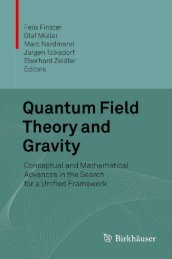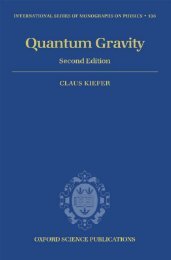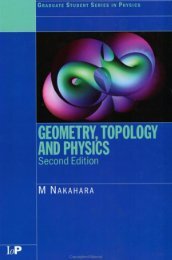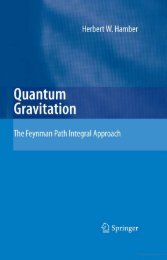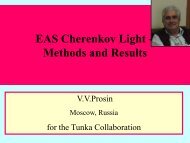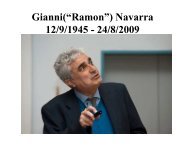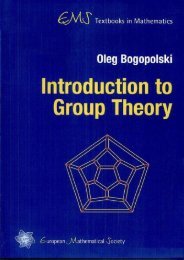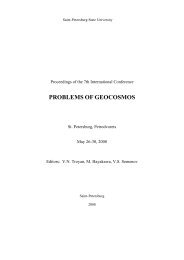- Page 2:
This page intentionally left blank
- Page 8: APPROACHES TO QUANTUM GRAVITYToward
- Page 12: A Sandra
- Page 18: viiiContents11 String theory, holog
- Page 22: ContributorsJ. AmbjørnThe Niels Bo
- Page 26: xiiList of contributorsD. OritiMax
- Page 32: PrefaceQuantum Gravity is a dream,
- Page 36: Prefacexviiare following in their s
- Page 40: Prefacexixenormous amount of progre
- Page 48: 1Unfinished revolutionC. ROVELLIOne
- Page 52: Unfinished revolution 5wit of empir
- Page 56: Unfinished revolution 7In general r
- Page 62: 10 C. RovelliIn addition, a number
- Page 66: 12 C. Rovelli[20] S. W. Hawking,
- Page 70: 14 G. ’t Hooftof time, of Cauchy
- Page 74: 16 G. ’t Hooftgenerally, in 2 + 1
- Page 78: 18 G. ’t Hooftof the small-distan
- Page 82: 20 G. ’t Hooftthat a theory exist
- Page 86: 22 G. ’t HooftThis means that the
- Page 90: 24 G. ’t Hooft2.7 Gauge- and diff
- Page 94: 3Does locality fail at intermediate
- Page 98: 28 R. D. Sorkina little thought ind
- Page 102: 30 R. D. Sorkinthis approach one no
- Page 106: 32 R. D. SorkinThe suggestion of os
- Page 110:
34 R. D. SorkinBut is our “discre
- Page 114:
36 R. D. Sorkin(as one might have e
- Page 118:
38 R. D. SorkinIt seems likely that
- Page 122:
40 R. D. Sorkinin particular, would
- Page 126:
42 R. D. Sorkinsmall, as discussed
- Page 130:
4Prolegomena to any future Quantum
- Page 134:
46 J. Stachelbreakups, it is import
- Page 138:
48 J. Stachelgauge fields and GR, t
- Page 142:
50 J. Stachelwhere S is any 2-surfa
- Page 146:
52 J. Stachelconnection (see, e.g.
- Page 150:
54 J. Stachelof a projective struct
- Page 154:
56 J. Stachelproblem on a spacelike
- Page 158:
58 J. Stachel(3) a break-up of the
- Page 162:
60 J. Stachelsimplification of the
- Page 166:
62 J. Stachelinvestigate (3 + 1) an
- Page 170:
64 J. Stachelpartitioned into slice
- Page 174:
66 J. Stachel[13] S. Frittelli, C.
- Page 178:
5Spacetime symmetries in histories
- Page 182:
70 N. Savvidouof time. The developm
- Page 186:
72 N. SavvidouIn order to define co
- Page 190:
74 N. SavvidouThe novel feature in
- Page 194:
76 N. SavvidouWe start instead from
- Page 198:
78 N. SavvidouRelation between the
- Page 202:
80 N. Savvidou5.4 A spacetime appro
- Page 206:
82 N. Savvidouthe T 0 variables - a
- Page 210:
Categorical geometry and the mathem
- Page 214:
86 L. Cranecalled morphisms [1]. A
- Page 218:
88 L. Craneare defined combinatoria
- Page 222:
90 L. Crane6.3.1 The BC categorical
- Page 226:
92 L. CraneClassical behavior occur
- Page 230:
94 L. CraneOne could then apply the
- Page 234:
96 L. CraneThis model also has a na
- Page 238:
98 L. Crane[13] J. Barrett and L. C
- Page 242:
100 O. DreyerIsspacetimefundamental
- Page 246:
102 O. DreyerSince the inverse prop
- Page 250:
104 O. Dreyerwhere we have denoted
- Page 254:
106 O. Dreyerand the points are the
- Page 258:
108 O. Dreyerm 1m 2=− v 2v 1. (7.
- Page 262:
110 O. DreyerIn addition to the pro
- Page 266:
112 R. PercacciIn section 8.2 I int
- Page 270:
114 R. Percaccithis case the theory
- Page 274:
116 R. PercacciThe requirement of r
- Page 278:
118 R. Percaccibe bounded. This is
- Page 282:
120 R. Percacciwhere the heat kerne
- Page 286:
122 R. Percacci~G10.80.60.40.2-0.2
- Page 290:
124 R. Percacciwill still be possib
- Page 294:
126 R. PercacciEinstein-Hilbert act
- Page 298:
128 R. Percacci[24] O. Lauscher and
- Page 302:
130 F. Markopoulouhas been claimed
- Page 306:
132 F. Markopoulouvertex x ∈ V (
- Page 310:
134 F. MarkopoulouNote that complet
- Page 314:
136 F. Markopoulou9.2.2 The meaning
- Page 318:
138 F. MarkopoulouFock space for th
- Page 322:
140 F. MarkopoulouA = 1A 2A 3A 4===
- Page 326:
142 F. Markopouloueffective theorie
- Page 330:
144 F. MarkopoulouQuantum Field The
- Page 334:
146 F. Markopoulouis concerned with
- Page 338:
148 F. MarkopoulouThe dynamics is p
- Page 342:
Questions and answers• Q - L. Cra
- Page 346:
152 Questions and answersHausdorff
- Page 350:
154 Questions and answers- A-R.Sork
- Page 354:
156 Questions and answersNow a good
- Page 358:
158 Questions and answerswould seem
- Page 362:
160 Questions and answers3. You men
- Page 366:
162 Questions and answers- A - R. P
- Page 370:
164 Questions and answersnotion of
- Page 376:
Part IIString/M-theory
- Page 382:
170 G. Horowitz and J. Polchinskia
- Page 386:
172 G. Horowitz and J. Polchinskiwh
- Page 390:
174 G. Horowitz and J. Polchinskiwi
- Page 394:
176 G. Horowitz and J. Polchinskiwh
- Page 398:
178 G. Horowitz and J. PolchinskiTh
- Page 402:
180 G. Horowitz and J. Polchinskimo
- Page 406:
182 G. Horowitz and J. PolchinskiNo
- Page 410:
184 G. Horowitz and J. Polchinskica
- Page 414:
186 G. Horowitz and J. Polchinski[2
- Page 418:
188 T. BanksThis looks peculiar to
- Page 422:
190 T. BanksThis lightning review o
- Page 426:
192 T. BanksSince the holographic s
- Page 430:
194 T. Banksdefinition of local evo
- Page 434:
196 T. Bankswe have postulated are
- Page 438:
198 T. Bankswith observerphilic def
- Page 442:
200 T. Banksde Sitter horizon is th
- Page 446:
202 T. Banksof the dS-Schwarzschild
- Page 450:
204 T. BanksThus, there are of orde
- Page 454:
206 T. Banksit has given us a const
- Page 458:
208 T. Banks[3] G. T. Horowitz, The
- Page 462:
12String field theoryW. TAYLOR12.1
- Page 466:
212 W. Taylorpossible configuration
- Page 470:
214 W. Taylorraising operators α
- Page 474:
216 W. Taylor❍❨ 1❍❍✟✟
- Page 478:
218 W. Taylorlevel truncation is to
- Page 482:
220 W. Taylordifferent descriptions
- Page 486:
222 W. TaylorIn closed string field
- Page 490:
224 W. Taylorclosed string field th
- Page 494:
226 W. Tayloror other 6D manifold.
- Page 498:
228 W. Taylor[37] W. Taylor, & B. Z
- Page 502:
230 Questions and answers3. You sta
- Page 506:
232 Questions and answers(proving t
- Page 512:
13Loop quantum gravityT. THIEMANN13
- Page 516:
Loop quantum gravity 23713.2 Canoni
- Page 520:
Loop quantum gravity 239In what fol
- Page 524:
Loop quantum gravity 241equivalence
- Page 528:
Loop quantum gravity 243∂ F τ f,
- Page 532:
Loop quantum gravity 245will play t
- Page 536:
Loop quantum gravity 247U(ϕ)T n =
- Page 540:
Loop quantum gravity 249a definite,
- Page 544:
Loop quantum gravity 251[28] T. Thi
- Page 548:
14Covariant loop quantum gravity?E.
- Page 552:
Covariant loop quantum gravity? 255
- Page 556:
Covariant loop quantum gravity? 257
- Page 560:
Covariant loop quantum gravity? 259
- Page 564:
Covariant loop quantum gravity? 261
- Page 568:
Covariant loop quantum gravity? 263
- Page 572:
Covariant loop quantum gravity? 265
- Page 576:
Covariant loop quantum gravity? 267
- Page 580:
Covariant loop quantum gravity? 269
- Page 584:
Covariant loop quantum gravity? 271
- Page 588:
The spin foam representation of loo
- Page 592:
The spin foam representation of loo
- Page 596:
The spin foam representation of loo
- Page 600:
The spin foam representation of loo
- Page 604:
The spin foam representation of loo
- Page 608:
The spin foam representation of loo
- Page 612:
The spin foam representation of loo
- Page 616:
The spin foam representation of loo
- Page 620:
The spin foam representation of loo
- Page 624:
Three-dimensional spin foam Quantum
- Page 628:
Three-dimensional spin foam Quantum
- Page 632:
Three-dimensional spin foam Quantum
- Page 636:
Three-dimensional spin foam Quantum
- Page 640:
Three-dimensional spin foam Quantum
- Page 644:
Three-dimensional spin foam Quantum
- Page 648:
Three-dimensional spin foam Quantum
- Page 652:
Three-dimensional spin foam Quantum
- Page 656:
Three-dimensional spin foam Quantum
- Page 660:
Three-dimensional spin foam Quantum
- Page 664:
The group field theory approach to
- Page 668:
The group field theory approach to
- Page 672:
The group field theory approach to
- Page 676:
The group field theory approach to
- Page 680:
The group field theory approach to
- Page 684:
The group field theory approach to
- Page 688:
The group field theory approach to
- Page 692:
The group field theory approach to
- Page 696:
The group field theory approach to
- Page 700:
The group field theory approach to
- Page 704:
The group field theory approach to
- Page 708:
Questions and answers 333the holes
- Page 712:
Questions and answers 335their vacu
- Page 716:
Questions and answers 337of some so
- Page 724:
18Quantum Gravity: the art of build
- Page 728:
Quantum Gravity: the art of buildin
- Page 732:
Quantum Gravity: the art of buildin
- Page 736:
Quantum Gravity: the art of buildin
- Page 740:
Quantum Gravity: the art of buildin
- Page 744:
Quantum Gravity: the art of buildin
- Page 748:
Quantum Gravity: the art of buildin
- Page 752:
Quantum Gravity: the art of buildin
- Page 756:
Quantum Gravity: the art of buildin
- Page 760:
Quantum Gravity: the art of buildin
- Page 764:
Quantum Regge calculus 361is given
- Page 768:
Quantum Regge calculus 363group. We
- Page 772:
Quantum Regge calculus 365emanating
- Page 776:
Quantum Regge calculus 367We will s
- Page 780:
Quantum Regge calculus 369reason, d
- Page 784:
Quantum Regge calculus 371gravitati
- Page 788:
Quantum Regge calculus 373where ξ
- Page 792:
Quantum Regge calculus 375[4] J. W.
- Page 796:
Quantum Regge calculus 377[52] M. L
- Page 800:
Consistent discretizations as a roa
- Page 804:
Consistent discretizations as a roa
- Page 808:
Consistent discretizations as a roa
- Page 812:
Consistent discretizations as a roa
- Page 816:
Consistent discretizations as a roa
- Page 820:
Consistent discretizations as a roa
- Page 824:
Consistent discretizations as a roa
- Page 828:
21The causal set approach to Quantu
- Page 832:
The causal set approach to Quantum
- Page 836:
The causal set approach to Quantum
- Page 840:
The causal set approach to Quantum
- Page 844:
The causal set approach to Quantum
- Page 848:
The causal set approach to Quantum
- Page 852:
The causal set approach to Quantum
- Page 856:
The causal set approach to Quantum
- Page 860:
The causal set approach to Quantum
- Page 864:
The causal set approach to Quantum
- Page 868:
The causal set approach to Quantum
- Page 872:
The causal set approach to Quantum
- Page 876:
The causal set approach to Quantum
- Page 880:
The causal set approach to Quantum
- Page 884:
The causal set approach to Quantum
- Page 888:
The causal set approach to Quantum
- Page 896:
22Quantum Gravity phenomenologyG. A
- Page 900:
Quantum Gravity phenomenology 429Ta
- Page 904:
Quantum Gravity phenomenology 431th
- Page 908:
Quantum Gravity phenomenology 433co
- Page 912:
Quantum Gravity phenomenology 435po
- Page 916:
Quantum Gravity phenomenology 437Fr
- Page 920:
Quantum Gravity phenomenology 439le
- Page 924:
Quantum Gravity phenomenology 441pr
- Page 928:
Quantum Gravity phenomenology 443wa
- Page 932:
Quantum Gravity phenomenology 445is
- Page 936:
Quantum Gravity phenomenology 447sc
- Page 940:
Quantum Gravity phenomenology 449[2
- Page 944:
Quantum Gravity and precision tests
- Page 948:
Quantum Gravity and precision tests
- Page 952:
Quantum Gravity and precision tests
- Page 956:
Quantum Gravity and precision tests
- Page 960:
Quantum Gravity and precision tests
- Page 964:
Quantum Gravity and precision tests
- Page 968:
Quantum Gravity and precision tests
- Page 972:
Quantum Gravity and precision tests
- Page 976:
Algebraic approach to Quantum Gravi
- Page 980:
Algebraic approach to Quantum Gravi
- Page 984:
Algebraic approach to Quantum Gravi
- Page 988:
Algebraic approach to Quantum Gravi
- Page 992:
Algebraic approach to Quantum Gravi
- Page 996:
Algebraic approach to Quantum Gravi
- Page 1000:
Algebraic approach to Quantum Gravi
- Page 1004:
Algebraic approach to Quantum Gravi
- Page 1008:
Algebraic approach to Quantum Gravi
- Page 1012:
Algebraic approach to Quantum Gravi
- Page 1016:
Algebraic approach to Quantum Gravi
- Page 1020:
Algebraic approach to Quantum Gravi
- Page 1024:
Algebraic approach to Quantum Gravi
- Page 1028:
25Doubly special relativityJ. KOWAL
- Page 1032:
Doubly special relativity 495DSR to
- Page 1036:
Doubly special relativity 497On the
- Page 1040:
Doubly special relativity 499some o
- Page 1044:
Doubly special relativity 501[x 0 ,
- Page 1048:
Doubly special relativity 503that t
- Page 1052:
Doubly special relativity 505can be
- Page 1056:
Doubly special relativity 507scale,
- Page 1060:
26From quantum reference frames to
- Page 1064:
From quantum reference frames to de
- Page 1068:
From quantum reference frames to de
- Page 1072:
From quantum reference frames to de
- Page 1076:
From quantum reference frames to de
- Page 1080:
From quantum reference frames to de
- Page 1084:
From quantum reference frames to de
- Page 1088:
From quantum reference frames to de
- Page 1092:
From quantum reference frames to de
- Page 1096:
From quantum reference frames to de
- Page 1100:
Lorentz invariance violation & its
- Page 1104:
Lorentz invariance violation & its
- Page 1108:
Lorentz invariance violation & its
- Page 1112:
Lorentz invariance violation & its
- Page 1116:
Lorentz invariance violation & its
- Page 1120:
Lorentz invariance violation & its
- Page 1124:
Lorentz invariance violation & its
- Page 1128:
Lorentz invariance violation & its
- Page 1132:
Lorentz invariance violation & its
- Page 1136:
Lorentz invariance violation & its
- Page 1140:
Generic predictions of quantum theo
- Page 1144:
Generic predictions of quantum theo
- Page 1148:
Generic predictions of quantum theo
- Page 1152:
Generic predictions of quantum theo
- Page 1156:
Generic predictions of quantum theo
- Page 1160:
Generic predictions of quantum theo
- Page 1164:
Generic predictions of quantum theo
- Page 1168:
Generic predictions of quantum theo
- Page 1172:
Generic predictions of quantum theo
- Page 1176:
Generic predictions of quantum theo
- Page 1180:
Generic predictions of quantum theo
- Page 1184:
Questions and answers• Q - L. Cra
- Page 1188:
Questions and answers 573frame. Jus
- Page 1192:
Questions and answers 575- A - J. K
- Page 1196:
Questions and answers 577where this
- Page 1200:
Questions and answers 579would allo
- Page 1204:
Index 581cosmology, 26, 155, 184, 1
- Page 1208:
Index 583emergent, 99, 109, 163, 17




